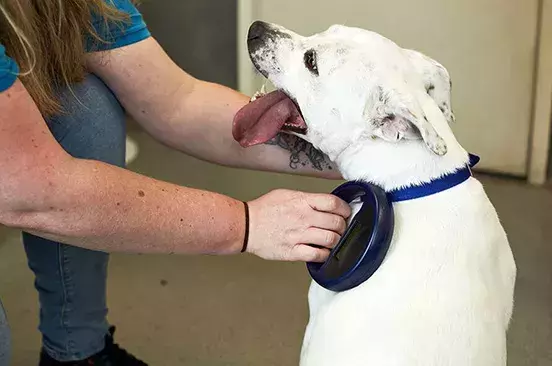A pet going missing can be a very scary time for any owner. While more often than not your dog will simply have wandered a little too far away, sadly we do know that thieves target pet dogs—sometimes to either sell them on to an unsuspecting new owner or as part of a scam to claim any reward that is offered for the animal’s return.

If your pet has strayed, there’s a chance they will be brought to a rescue. At Battersea, we run a lost dog and cat service to help reunite owners with missing pets if they come into our care. To report a lost dog or cat, please complete this form our website.
While the risk of your dog being stolen is thankfully relatively low, it’s important to be aware of your surroundings on walks and when your dog is outside the house. Here are some steps you can take to reduce the risk of dog theft.
Keeping your dog safe
Once stolen, a dog can easily be hidden and transported to another area, making it very difficult to track them down. Prevention is therefore key to keeping your pet safe:
- Avoid leaving your dog unsupervised in public – do not leave your dog tied up outside a shop or left alone inside your car while you run an errand.
- Make sure your garden is secure – when you let your dog out, don’t let them out of your sight and ensure any gates are locked and there are no gaps in fences or walls.
- Vary your walking habits – try different routes and, if possible, avoid walking at the exact same times every day to prevent your activity from becoming predictable.
- Recall practice – train your dog to come back when called. If you’re not sure they will return when asked, keep them on a lead, especially in any areas you or your dog may not know very well.
- Microchipping – always keep your microchip contact details up to date so if your pet does go missing, they can be traced back to you. It is a legal requirement in the UK for all dogs aged eight weeks and over to be microchipped and registered on a compliant database.
- ID – as well as a microchip it is a legal requirement for all dogs to wear a collar with an ID tag while out in public spaces. By law you should include your name and address, and you can add your mobile number if you wish but avoid putting your dog’s name on the disc.
- Photos – we’re sure you take lots of photos of your dog already, but having up to date photos, including any identifying features and some of you with your pet, will be important if you do have to report him or her missing.
What to do if your dog is stolen
A pet going missing is understandably a very stressful and upsetting time. Time is of the essence when it comes to dog theft, so it is important to act immediately:
- Report your dog missing to your local council’s dog warden. Their contact details will be available on your council’s website.
- If you suspect your pet has been stolen, you should contact the police and report the crime as a theft. Call 101 or report it online.
- Contact the microchip database your dog is registered with so that they can record your pet as missing. If anyone then tries to change the chip details, you will be contacted.
- Reach out to the local community. Speak to dog walkers in your area, put up posters where you are allowed to do so, and post in local Facebook groups.
- In the UK there are many websites designed to help owners report their pets as missing, including Dog Lost, Pets Reunited and the National Pet Register. Report your dog as missing on as many sites as possible.
- Contact any rescue centres in your area. If your pet has strayed, there’s a chance they will be brought to a rescue. Some organisations, including Battersea, run missing and found pet helplines. To report a lost dog or cat, please complete this form.





